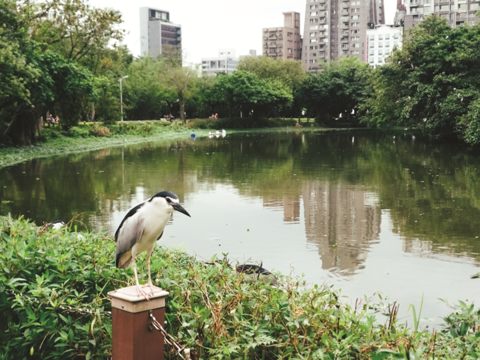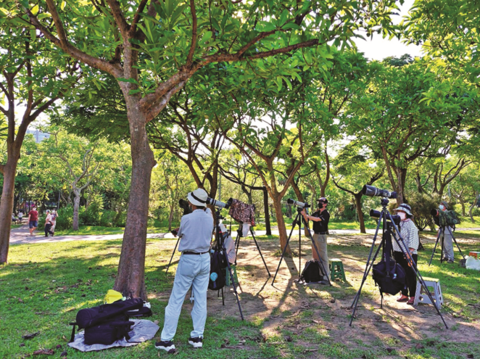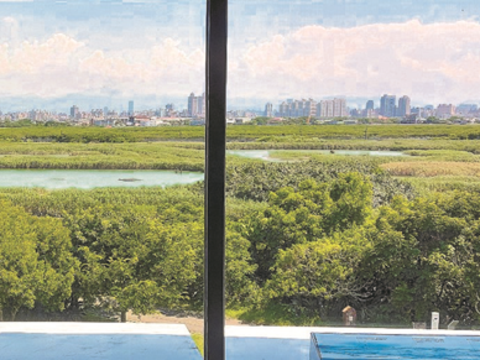Post date:2022-09-13
2247
TAIPEI #29 (2022 Autumn)
Taipei Birdwatching 101:
A Dreamland for Birds and Birdwatchers
Author AYCC
Photographer Cheng-cai Chiu, Yengping
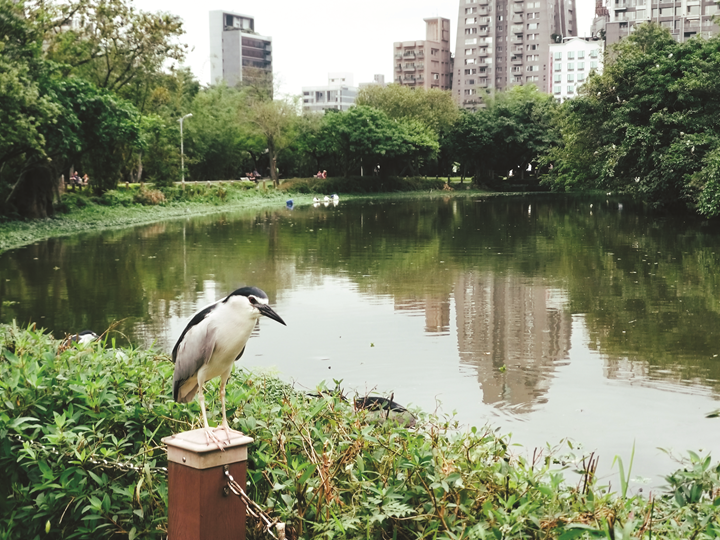 ▲Birds like the Black-crowned Night Heron are commonly seen near a pond, where they can not only nest but also feast on fish. (Photo/Yengping)
▲Birds like the Black-crowned Night Heron are commonly seen near a pond, where they can not only nest but also feast on fish. (Photo/Yengping)
Outdoorsy people typically like to partake of activities such as hiking, biking, swimming and surfing. In Taipei, there is one more choice they can add to that list — birdwatching.
“Birdwatching is the most rewarding outdoor activity one can enjoy in both the city and the wild,” says Cheng-cai Chiu (邱盛材), a life-long bird photographer based in Taipei. “You can do it in the mountains, in the parks, or even from the window in your house!”
According to Chiu, Taipei’s superb ecosystem and perfect landscape creates natural habitats for birds, and the weather in autumn could not be more suitable for birding. Starting from September, winter migrants set off on their journey south to find suitable foraging habitats due to seasonal changes. With Taiwan being a mid-trip supply station (or destination, for some birds), all kinds of birds stop by or nest at habitable places such as Guandu (關渡) or Yangmingshan, making Taipei a dreamland for birdwatchers.
As time rolls into migration season, we put together a birding guide with the help of Chiu for you to start your own birdwatching journey. “Expect the unexpected, accept the unacceptable,” Chiu also points out, highlighting the mindset any good birdwatcher should have.
As the weather and birds are both unpredictable, it is not 100% guaranteed that you will see what you want to see. On the other hand, there’s always the chance of spotting a rare find. “At the end of the day, it will always be a relaxing day in the wild,” Chiu says.
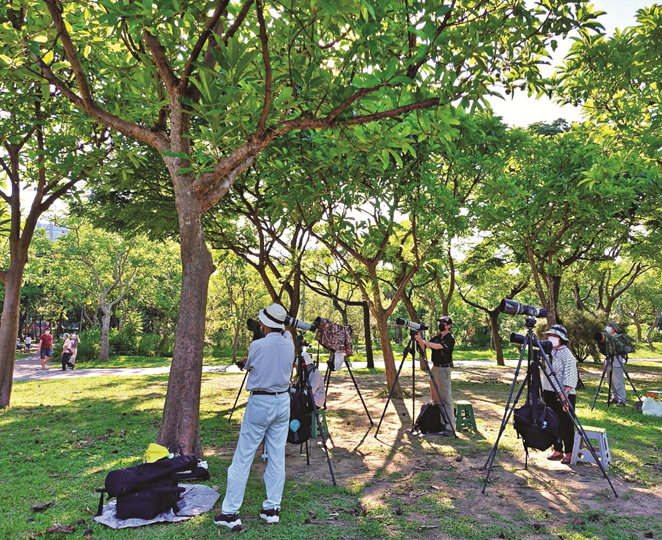 ▲Many birdwatchers gather in Daan Park, hoping to spot a rare find and capture photos of our feathered friends. (Photo/Yengping)
▲Many birdwatchers gather in Daan Park, hoping to spot a rare find and capture photos of our feathered friends. (Photo/Yengping)
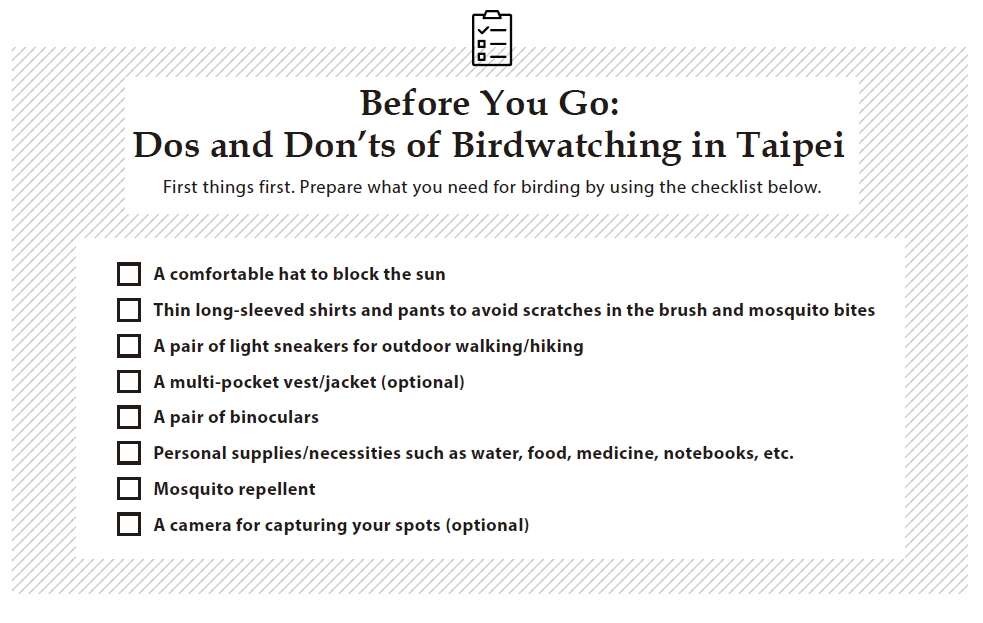 Most importantly, always follow the principle of “Leave No Trace (無痕山林)” — take nothing but photos, leave nothing but footprints. Chiu also suggests wearing shirts with earth-tone colors to blend in with the environment and lower the possibility of startling the birds. When birding with friends, lower your voice and slow your movements to avoid disturbing any woodland creatures. If you’re mentally and physically prepared, let the journey begin!
Most importantly, always follow the principle of “Leave No Trace (無痕山林)” — take nothing but photos, leave nothing but footprints. Chiu also suggests wearing shirts with earth-tone colors to blend in with the environment and lower the possibility of startling the birds. When birding with friends, lower your voice and slow your movements to avoid disturbing any woodland creatures. If you’re mentally and physically prepared, let the journey begin!
 Migratory birds are always the highlight of birdwatching in autumn. Chiu also graciously provides us with some suggestions on the endemic species in Taiwan that should also be added to the rare bird list of any true bird lover.
Migratory birds are always the highlight of birdwatching in autumn. Chiu also graciously provides us with some suggestions on the endemic species in Taiwan that should also be added to the rare bird list of any true bird lover.


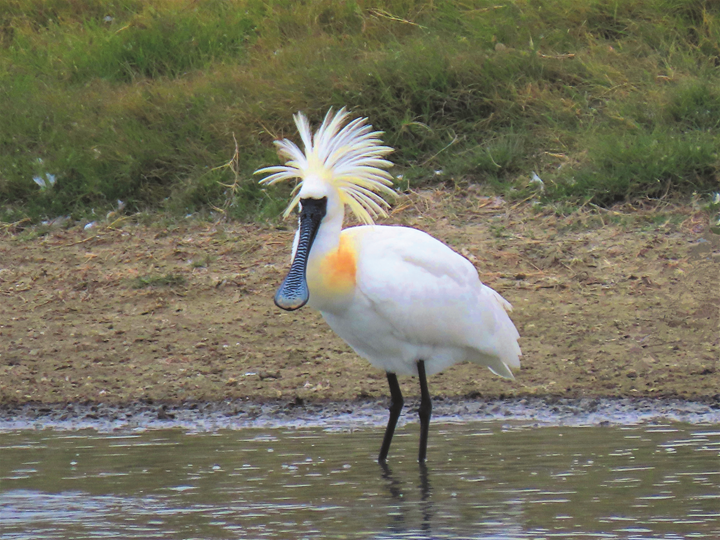
Being nearly extinct in the wild, the Black-faced Spoonbill is considered an icon when it comes to birdwatching in Taiwan. As the name suggests, they are covered with bare and black spots from their foreheads to their long, spoon-shaped beaks. Like any waterbird, they enjoy habitats such as wetlands or fish ponds, which makes Guandu Nature Park (關渡自然公園) a great spot for them to take a rest in Taipei.

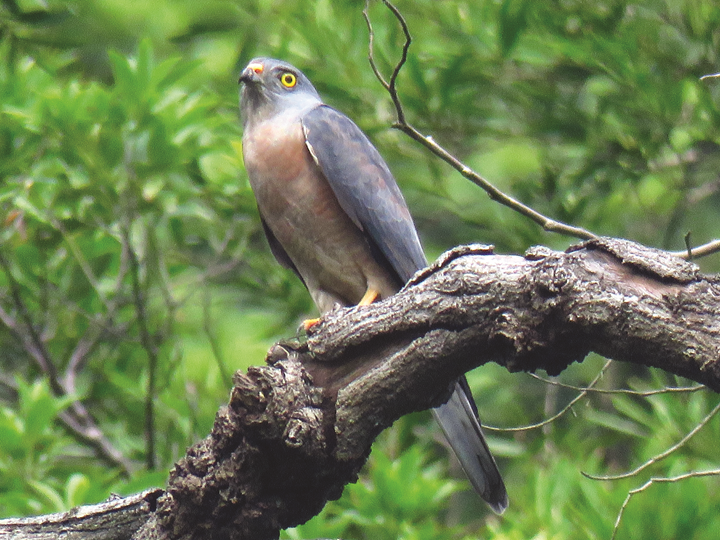
As winter migrants, Chinese Sparrowhawks’ migration route ranges from Korea, to Taiwan and on to the Philippines. In Taiwan, these gray-back hawks with sharp, yellow or brownish-red eyes love to stop by Taipei’s Beitou and Yangmingshan areas for a day or less, then move on to Kenting (墾丁) in southern Taiwan. September and October are the best time to see them heading south.

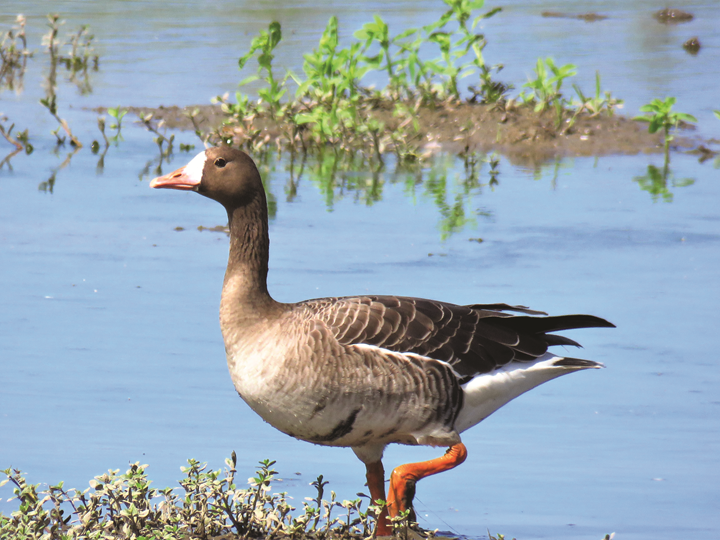
Originating from the grasslands in northern Siberia, Greater White-fronted Geese are rare but precious guests in Taipei in autumn. The most important features of the birds are their pink beaks and white foreheads between their mouth and eyes. Taipei Geese Protected Area (台北市野雁保護區) in Wanhua (萬華) is the most recent place where they were spotted in the city in 2021.

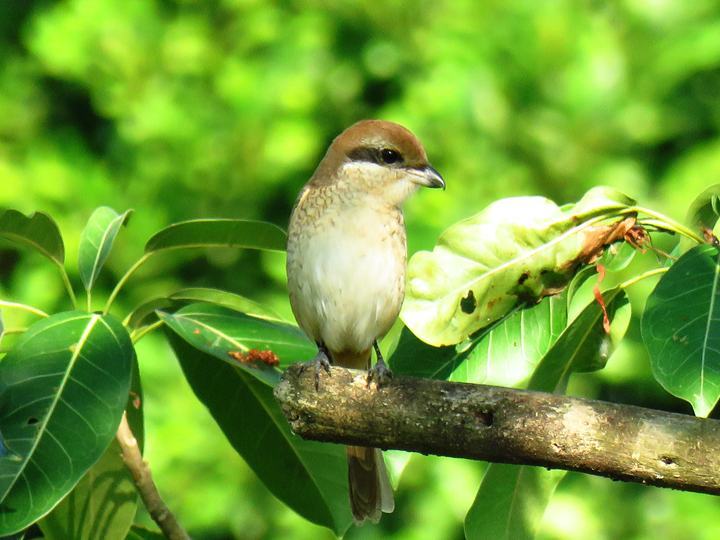
Small but fierce, Brown Shrikes are known for their speedy hunting skills, targeting small creatures like mice and insects. The black feathers around their eyes stand out from their brown and red plumage, making them look like the masked Daredevil. Brown Shrikes like to perch on the treetops, which makes them an easy spot if you’re in riverside parks in autumn in Taipei.

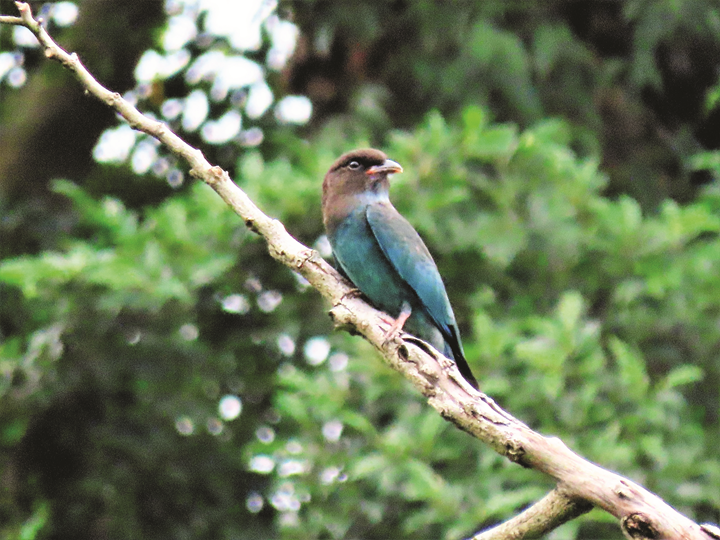
Even with a name in Mandarin that means “Buddha, dharma and sangha,” Oriental Dollarbirds actually have no place in Buddhist scriptures. The name comes from their distinguishing tweedle that seems to say “but, po, so,” which sounds like a recitation of the Triratna. These beauties have gradient bodies that transit from black to blue to emerald. They prefer open wooded areas such as the mountains in Beitou to build their nests in.


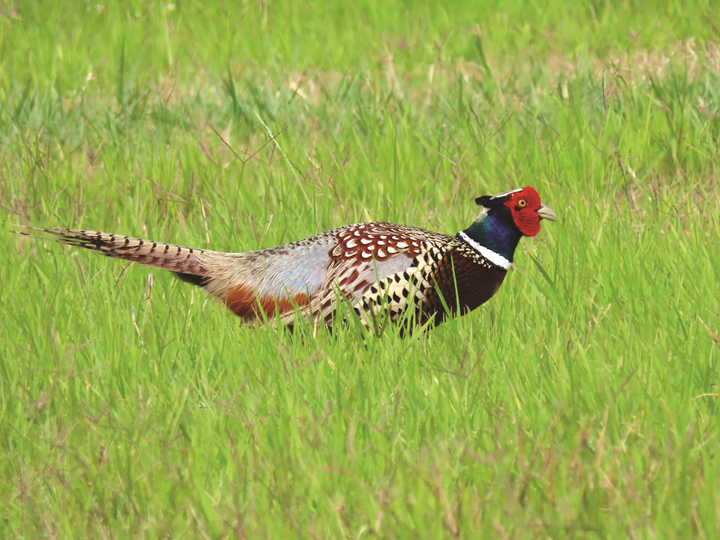
Male Ring-necked Pheasants are characterized by a circle of white feathers on their necks that looks like a collar and the red skin on their face. Living on the plains, they are also known as the “pearl of the grasslands.” Try your luck in Guandu Nature Park if you want to see a Ring-necked Pheasant in Taipei.

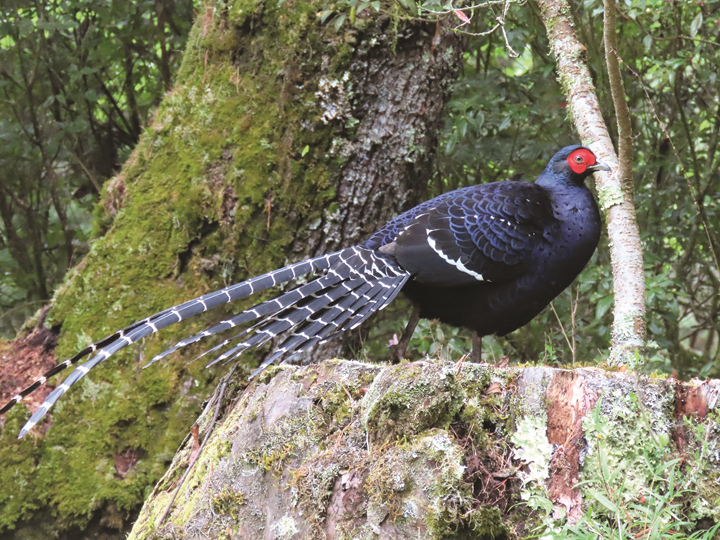
A symbolic animal of Taiwan, the Mikado Pheasant (about 75-90cm in length) is the largest endemic bird species in the country. Males have a body of dark purple-blue plumage with horizontal white bands on their long tails. They prefer high-altitude habitats such as Daxueshan (大雪山) in central Taiwan and Alishan (阿里山) in the south, while Yangmingshan might be your best shot in Taipei. If not, check your New Taiwan thousand-dollar-bill, and you will find a couple!

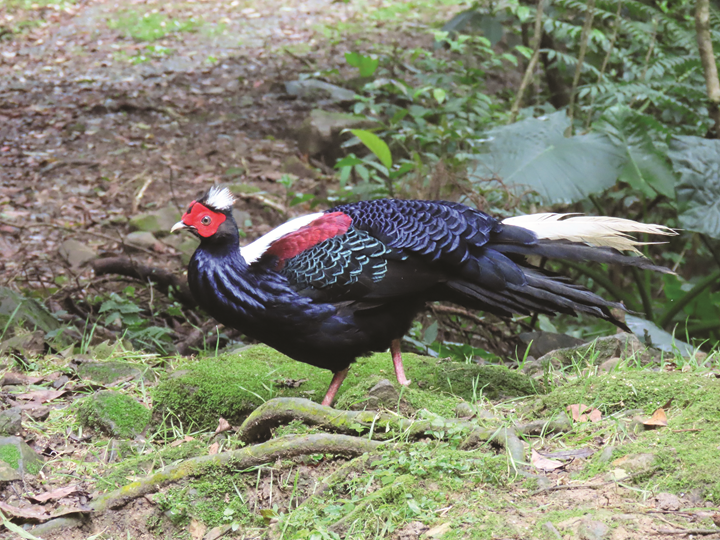
Similar to the Mikado Pheasant, Swinhoe's Pheasant (about 60-80cm in length) is also a big, blue bird. However, their white crest, red wattles and red legs distinguish them from Mikado Pheasants. In recent years, Swinhoe's Pheasants have been spotted in suburban forests such as Xiangshan (象山) and mountains in Nangang (南港) thanks to successful ecological restoration projects.


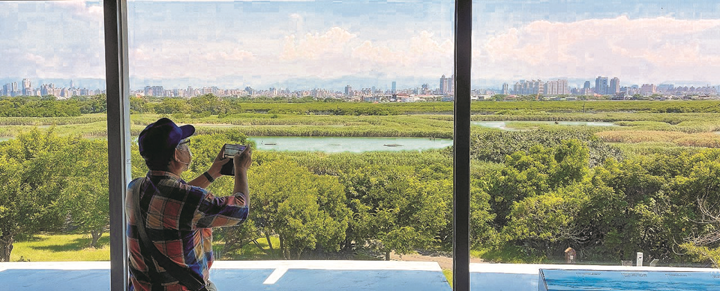 ▲The birdwatching platform in Guandu Nature Park provides a grand view for bird lovers to spot some rare treasures. (Photo/Yengping)
▲The birdwatching platform in Guandu Nature Park provides a grand view for bird lovers to spot some rare treasures. (Photo/Yengping)
Sitting at the junction of the Tamsui (淡水河) and Keelung Rivers (基隆河), Guandu Nature Park is one of the largest habitats for migrating birds in Taipei. With abundant grasslands and wetlands, over 300 species of birds have been recorded in the park, including Black-faced Spoonbills, Crested Serpent Eagles (大冠鷲), and more. The park also provides regular birdwatching tours on weekends. In addition, Taipei International Birdwatching Fair (台北國際賞鳥博覽會) takes place here every year. In 2022, it will be held from November 5th to November 6th, including a series of activities such as a creative market and a birding workshop.
▶️ Click here to visit the Guandu Nature Park Website
 With 28 hectares of space, Huajiang Wild Duck Nature Park is where the Dahan River (大漢溪) meets the Xindian River (新店溪), creating a muddy wetland landscape with abundant food sources that is perfect for waterbirds. Commonly spotted here are Eurasian Teals (小水鴨), Mallards (綠頭鴨), Great Egrets (大白鷺), Spot-billed Ducks (花嘴鴨) and Gray Herons (蒼鷺).
With 28 hectares of space, Huajiang Wild Duck Nature Park is where the Dahan River (大漢溪) meets the Xindian River (新店溪), creating a muddy wetland landscape with abundant food sources that is perfect for waterbirds. Commonly spotted here are Eurasian Teals (小水鴨), Mallards (綠頭鴨), Great Egrets (大白鷺), Spot-billed Ducks (花嘴鴨) and Gray Herons (蒼鷺).
 Taipei Botanical Garden is home to many resident birds, such as Black-crowned Night Herons (夜鷺), Malayan Night Herons (黑冠麻鷺), and Light-vented Bulbuls (白頭翁). As there’s a lotus pond on the premises, waterbirds like Little Egrets (小白鷺) and Common Moorhens (紅冠水雞) are often found in the garden as well.
Taipei Botanical Garden is home to many resident birds, such as Black-crowned Night Herons (夜鷺), Malayan Night Herons (黑冠麻鷺), and Light-vented Bulbuls (白頭翁). As there’s a lotus pond on the premises, waterbirds like Little Egrets (小白鷺) and Common Moorhens (紅冠水雞) are often found in the garden as well.
 Daan Park, known as the “lungs of Taipei,” is the most accessible birdwatching spot in the city. Most afternoons, you can see tons of birdwatchers decked out in their camouflage shirts, quietly waiting for the Taiwan Barbets (五色鳥) on the trees to tweet their midday song. On the other side of the park, bold Crested Mynas (八哥) and Pigeons are twittering away, enjoying the day as people nearby enjoy their picnic.
Daan Park, known as the “lungs of Taipei,” is the most accessible birdwatching spot in the city. Most afternoons, you can see tons of birdwatchers decked out in their camouflage shirts, quietly waiting for the Taiwan Barbets (五色鳥) on the trees to tweet their midday song. On the other side of the park, bold Crested Mynas (八哥) and Pigeons are twittering away, enjoying the day as people nearby enjoy their picnic.
 Yangmingshan National Park (陽明山國家公園) is not only a perfect place for birdwatching, but a top attraction in Taipei in its own right. If this is your first visit, narrow down your areas of exploration to Datunshan (大屯山, Mt. Datun) and Miantianshan (面天山, Mt. Miantian), as the vegetation combines broadleaf forests, miscanthus and bamboo, making it a very biodiverse region. While Chinese Bamboo Partridges (竹雞) and Chinese White-eye (綠繡眼) are regular residents in the national park, you may also find Taiwan Blue Magpies (台灣藍鵲) or Collared Scops Owls (領角鴞) if you’re lucky!
Yangmingshan National Park (陽明山國家公園) is not only a perfect place for birdwatching, but a top attraction in Taipei in its own right. If this is your first visit, narrow down your areas of exploration to Datunshan (大屯山, Mt. Datun) and Miantianshan (面天山, Mt. Miantian), as the vegetation combines broadleaf forests, miscanthus and bamboo, making it a very biodiverse region. While Chinese Bamboo Partridges (竹雞) and Chinese White-eye (綠繡眼) are regular residents in the national park, you may also find Taiwan Blue Magpies (台灣藍鵲) or Collared Scops Owls (領角鴞) if you’re lucky!
Taipei Birdwatching 101:
A Dreamland for Birds and Birdwatchers
Author AYCC
Photographer Cheng-cai Chiu, Yengping
 ▲Birds like the Black-crowned Night Heron are commonly seen near a pond, where they can not only nest but also feast on fish. (Photo/Yengping)
▲Birds like the Black-crowned Night Heron are commonly seen near a pond, where they can not only nest but also feast on fish. (Photo/Yengping)Outdoorsy people typically like to partake of activities such as hiking, biking, swimming and surfing. In Taipei, there is one more choice they can add to that list — birdwatching.
“Birdwatching is the most rewarding outdoor activity one can enjoy in both the city and the wild,” says Cheng-cai Chiu (邱盛材), a life-long bird photographer based in Taipei. “You can do it in the mountains, in the parks, or even from the window in your house!”
According to Chiu, Taipei’s superb ecosystem and perfect landscape creates natural habitats for birds, and the weather in autumn could not be more suitable for birding. Starting from September, winter migrants set off on their journey south to find suitable foraging habitats due to seasonal changes. With Taiwan being a mid-trip supply station (or destination, for some birds), all kinds of birds stop by or nest at habitable places such as Guandu (關渡) or Yangmingshan, making Taipei a dreamland for birdwatchers.
As time rolls into migration season, we put together a birding guide with the help of Chiu for you to start your own birdwatching journey. “Expect the unexpected, accept the unacceptable,” Chiu also points out, highlighting the mindset any good birdwatcher should have.
As the weather and birds are both unpredictable, it is not 100% guaranteed that you will see what you want to see. On the other hand, there’s always the chance of spotting a rare find. “At the end of the day, it will always be a relaxing day in the wild,” Chiu says.
 ▲Many birdwatchers gather in Daan Park, hoping to spot a rare find and capture photos of our feathered friends. (Photo/Yengping)
▲Many birdwatchers gather in Daan Park, hoping to spot a rare find and capture photos of our feathered friends. (Photo/Yengping) Most importantly, always follow the principle of “Leave No Trace (無痕山林)” — take nothing but photos, leave nothing but footprints. Chiu also suggests wearing shirts with earth-tone colors to blend in with the environment and lower the possibility of startling the birds. When birding with friends, lower your voice and slow your movements to avoid disturbing any woodland creatures. If you’re mentally and physically prepared, let the journey begin!
Most importantly, always follow the principle of “Leave No Trace (無痕山林)” — take nothing but photos, leave nothing but footprints. Chiu also suggests wearing shirts with earth-tone colors to blend in with the environment and lower the possibility of startling the birds. When birding with friends, lower your voice and slow your movements to avoid disturbing any woodland creatures. If you’re mentally and physically prepared, let the journey begin! Migratory birds are always the highlight of birdwatching in autumn. Chiu also graciously provides us with some suggestions on the endemic species in Taiwan that should also be added to the rare bird list of any true bird lover.
Migratory birds are always the highlight of birdwatching in autumn. Chiu also graciously provides us with some suggestions on the endemic species in Taiwan that should also be added to the rare bird list of any true bird lover.


Being nearly extinct in the wild, the Black-faced Spoonbill is considered an icon when it comes to birdwatching in Taiwan. As the name suggests, they are covered with bare and black spots from their foreheads to their long, spoon-shaped beaks. Like any waterbird, they enjoy habitats such as wetlands or fish ponds, which makes Guandu Nature Park (關渡自然公園) a great spot for them to take a rest in Taipei.


As winter migrants, Chinese Sparrowhawks’ migration route ranges from Korea, to Taiwan and on to the Philippines. In Taiwan, these gray-back hawks with sharp, yellow or brownish-red eyes love to stop by Taipei’s Beitou and Yangmingshan areas for a day or less, then move on to Kenting (墾丁) in southern Taiwan. September and October are the best time to see them heading south.


Originating from the grasslands in northern Siberia, Greater White-fronted Geese are rare but precious guests in Taipei in autumn. The most important features of the birds are their pink beaks and white foreheads between their mouth and eyes. Taipei Geese Protected Area (台北市野雁保護區) in Wanhua (萬華) is the most recent place where they were spotted in the city in 2021.


Small but fierce, Brown Shrikes are known for their speedy hunting skills, targeting small creatures like mice and insects. The black feathers around their eyes stand out from their brown and red plumage, making them look like the masked Daredevil. Brown Shrikes like to perch on the treetops, which makes them an easy spot if you’re in riverside parks in autumn in Taipei.


Even with a name in Mandarin that means “Buddha, dharma and sangha,” Oriental Dollarbirds actually have no place in Buddhist scriptures. The name comes from their distinguishing tweedle that seems to say “but, po, so,” which sounds like a recitation of the Triratna. These beauties have gradient bodies that transit from black to blue to emerald. They prefer open wooded areas such as the mountains in Beitou to build their nests in.



Male Ring-necked Pheasants are characterized by a circle of white feathers on their necks that looks like a collar and the red skin on their face. Living on the plains, they are also known as the “pearl of the grasslands.” Try your luck in Guandu Nature Park if you want to see a Ring-necked Pheasant in Taipei.


A symbolic animal of Taiwan, the Mikado Pheasant (about 75-90cm in length) is the largest endemic bird species in the country. Males have a body of dark purple-blue plumage with horizontal white bands on their long tails. They prefer high-altitude habitats such as Daxueshan (大雪山) in central Taiwan and Alishan (阿里山) in the south, while Yangmingshan might be your best shot in Taipei. If not, check your New Taiwan thousand-dollar-bill, and you will find a couple!


Similar to the Mikado Pheasant, Swinhoe's Pheasant (about 60-80cm in length) is also a big, blue bird. However, their white crest, red wattles and red legs distinguish them from Mikado Pheasants. In recent years, Swinhoe's Pheasants have been spotted in suburban forests such as Xiangshan (象山) and mountains in Nangang (南港) thanks to successful ecological restoration projects.


 ▲The birdwatching platform in Guandu Nature Park provides a grand view for bird lovers to spot some rare treasures. (Photo/Yengping)
▲The birdwatching platform in Guandu Nature Park provides a grand view for bird lovers to spot some rare treasures. (Photo/Yengping)Sitting at the junction of the Tamsui (淡水河) and Keelung Rivers (基隆河), Guandu Nature Park is one of the largest habitats for migrating birds in Taipei. With abundant grasslands and wetlands, over 300 species of birds have been recorded in the park, including Black-faced Spoonbills, Crested Serpent Eagles (大冠鷲), and more. The park also provides regular birdwatching tours on weekends. In addition, Taipei International Birdwatching Fair (台北國際賞鳥博覽會) takes place here every year. In 2022, it will be held from November 5th to November 6th, including a series of activities such as a creative market and a birding workshop.
▶️ Click here to visit the Guandu Nature Park Website
 With 28 hectares of space, Huajiang Wild Duck Nature Park is where the Dahan River (大漢溪) meets the Xindian River (新店溪), creating a muddy wetland landscape with abundant food sources that is perfect for waterbirds. Commonly spotted here are Eurasian Teals (小水鴨), Mallards (綠頭鴨), Great Egrets (大白鷺), Spot-billed Ducks (花嘴鴨) and Gray Herons (蒼鷺).
With 28 hectares of space, Huajiang Wild Duck Nature Park is where the Dahan River (大漢溪) meets the Xindian River (新店溪), creating a muddy wetland landscape with abundant food sources that is perfect for waterbirds. Commonly spotted here are Eurasian Teals (小水鴨), Mallards (綠頭鴨), Great Egrets (大白鷺), Spot-billed Ducks (花嘴鴨) and Gray Herons (蒼鷺). Taipei Botanical Garden is home to many resident birds, such as Black-crowned Night Herons (夜鷺), Malayan Night Herons (黑冠麻鷺), and Light-vented Bulbuls (白頭翁). As there’s a lotus pond on the premises, waterbirds like Little Egrets (小白鷺) and Common Moorhens (紅冠水雞) are often found in the garden as well.
Taipei Botanical Garden is home to many resident birds, such as Black-crowned Night Herons (夜鷺), Malayan Night Herons (黑冠麻鷺), and Light-vented Bulbuls (白頭翁). As there’s a lotus pond on the premises, waterbirds like Little Egrets (小白鷺) and Common Moorhens (紅冠水雞) are often found in the garden as well. Daan Park, known as the “lungs of Taipei,” is the most accessible birdwatching spot in the city. Most afternoons, you can see tons of birdwatchers decked out in their camouflage shirts, quietly waiting for the Taiwan Barbets (五色鳥) on the trees to tweet their midday song. On the other side of the park, bold Crested Mynas (八哥) and Pigeons are twittering away, enjoying the day as people nearby enjoy their picnic.
Daan Park, known as the “lungs of Taipei,” is the most accessible birdwatching spot in the city. Most afternoons, you can see tons of birdwatchers decked out in their camouflage shirts, quietly waiting for the Taiwan Barbets (五色鳥) on the trees to tweet their midday song. On the other side of the park, bold Crested Mynas (八哥) and Pigeons are twittering away, enjoying the day as people nearby enjoy their picnic. Yangmingshan National Park (陽明山國家公園) is not only a perfect place for birdwatching, but a top attraction in Taipei in its own right. If this is your first visit, narrow down your areas of exploration to Datunshan (大屯山, Mt. Datun) and Miantianshan (面天山, Mt. Miantian), as the vegetation combines broadleaf forests, miscanthus and bamboo, making it a very biodiverse region. While Chinese Bamboo Partridges (竹雞) and Chinese White-eye (綠繡眼) are regular residents in the national park, you may also find Taiwan Blue Magpies (台灣藍鵲) or Collared Scops Owls (領角鴞) if you’re lucky!
Yangmingshan National Park (陽明山國家公園) is not only a perfect place for birdwatching, but a top attraction in Taipei in its own right. If this is your first visit, narrow down your areas of exploration to Datunshan (大屯山, Mt. Datun) and Miantianshan (面天山, Mt. Miantian), as the vegetation combines broadleaf forests, miscanthus and bamboo, making it a very biodiverse region. While Chinese Bamboo Partridges (竹雞) and Chinese White-eye (綠繡眼) are regular residents in the national park, you may also find Taiwan Blue Magpies (台灣藍鵲) or Collared Scops Owls (領角鴞) if you’re lucky!Gallery
:::
Popular articles
 Adventures in Taipei’s Best Inclusive Children Playgrounds (TAIPEI Quarterly 2022 Autumn Vol.29)
Adventures in Taipei’s Best Inclusive Children Playgrounds (TAIPEI Quarterly 2022 Autumn Vol.29) Exploring a Manga Artist's Daydream (TAIPEI Quarterly 2022 Autumn Vol.29)
Exploring a Manga Artist's Daydream (TAIPEI Quarterly 2022 Autumn Vol.29) Waterfall Wonderland: Finding the Falls of Yangmingshan
Waterfall Wonderland: Finding the Falls of Yangmingshan Breaking the Stereotypes of the Unhoused: Yo Wash Creates a New Look for Taipei (TAIPEI Quarterly 2022 Autumn Vol.29)
Breaking the Stereotypes of the Unhoused: Yo Wash Creates a New Look for Taipei (TAIPEI Quarterly 2022 Autumn Vol.29) Stepping on the Stage of Dreams: Three Artists Share Their Taipei Dreams with the World (TAIPEI Quarterly 2022 Autumn Vol.29)
Stepping on the Stage of Dreams: Three Artists Share Their Taipei Dreams with the World (TAIPEI Quarterly 2022 Autumn Vol.29) A Baker's Dream: A Tour of Three Scrumptious Bakeries in Taipei (TAIPEI Quarterly 2022 Autumn Vol.29)
A Baker's Dream: A Tour of Three Scrumptious Bakeries in Taipei (TAIPEI Quarterly 2022 Autumn Vol.29)
 Taipei Birdwatching 101: A Dreamland for Birds and Birdwatchers (TAIPEI Quarterly 2022 Autumn Vol.29)
Taipei Birdwatching 101: A Dreamland for Birds and Birdwatchers (TAIPEI Quarterly 2022 Autumn Vol.29)